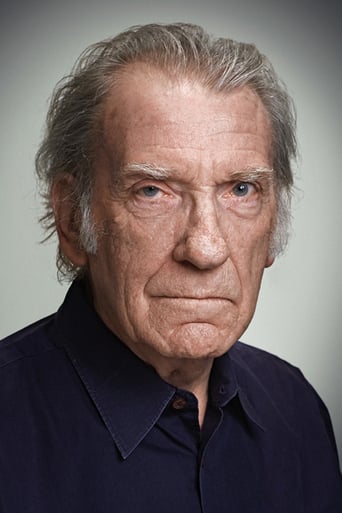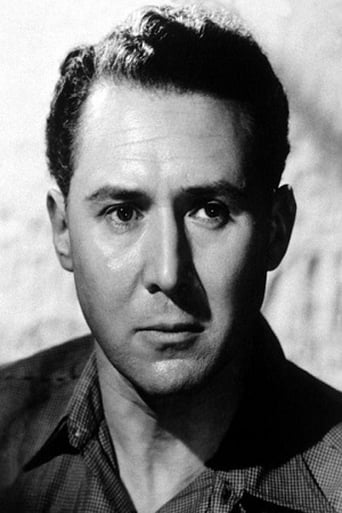Stoutor
It's not great by any means, but it's a pretty good movie that didn't leave me filled with regret for investing time in it.
Kaelan Mccaffrey
Like the great film, it's made with a great deal of visible affection both in front of and behind the camera.
Staci Frederick
Blistering performances.
Cheryl
A clunky actioner with a handful of cool moments.
HarlekwinBlog
The drama presented here is well structured and well acted. Peter O'Tool and Peter Strauss bring a sense of depth to their characters and are more than ably supported by the rest of the cast.
Production looks perhaps a little dated compared to modern standards.The series was filmed in Judea, lending a authenticity to the shots. We were lucky enough to visit the Holy Land in 2017.
Part of our trip was to Masada. Knowing just a little of the historic context makes the drama more fulfilling but a worthy watch without it.
drystyx
From the late sixties till very recently, film producers had a very pro-Atheist agenda, and contrived most stories to fit into that narrow spectrum. This is one such example.The story is fairly well known. A Jimmy Jones style mass suicide of maniacs, the leaders of whom had as little to do with Jewish religion as today's suicide bombers have to do with the mosques they would only attend for rare occasions to persuade others to join their cause. It is where we get the word "zealots", which has come to connote more religious groups.The film does make it clear, however, that the leading zealots were not religious, and had issues with the spiritual ones who joined them.The leader of the group, played by Strauss, is a maniac from beginning to end. We are given enough of his personality to see why feeble minds would believe him, and we can interpret his nature pretty accurately. It boggles the mind as to how the Roman commander is fooled by him. He clearly uses his family man position to further his lust for power and blood. He is a true rendition of a homicidal maniac. The film tries to make it look as though he may have turned into a maniac when he got religion, but in real life, he is truly just a monster who only uses religion for his blood-lust. He has no real faith. One scene shows him supposedly crying for the innocent, and praying, but in real life, this would be completely for show, and would never fool a true Roman military mind.The Roman commander seems to be the sanest, and thus is viewed as an Atheist. His barbaric acts are done unwillingly. This fits in with the true Hollywood agenda of making people believe no one is ever killed by Atheism, which makes the film laughably ridiculous.However, the performances are great. Most of the minor characters are very good. The Jewish mistress is very believable.The fight scenes with Struass look poorly done, but not as poor as later movies in which we are expected to believe men loaded with full armor can move like acrobats, and no one ever has the Sun in his eyes.The contrived point of view cheapens what could have been a great movie.
justin_james753
Masada is an average epic that has been treated generously. It's not horrible, but it could have been better. A good review must look at, aside from the basics, the film's themes, symbolism, and the quality of the plot. The film is inaccurate, but why? What is the film's message? And does the film's message and inaccuracy make it worth buying, renting, or ignoring? But first, the basics. The plot is simple: good guys versus bad guys. No clever twists, except in the end perhaps, and nothing original for its time. The setting is the Jewish Revolt of 66-74 AD. The Romans have just captured Jerusalem, but a handful of zealous freedom fighters escape to the fortress Masada. It is a spectacle in the mold of Spartacus and Ben-Hur, one of the last films of that style. The plot unfolds well but is not engaging or intellectual. Romance is included in the film between the Roman general Silva (O' Toole) and a Jewish whore. It was unnecessary.The acting is mixed. Americans were cast to play the underdogs, the Jews, and Englishmen were cast to play the Romans. As a result talent was concentrated on the Roman side which made for uneven cinema. Peter Strauss who played the Jewish leader is an exception, but the rest were nonentities. On the Roman side there were veteran British actors of tremendous quality such as Peter O'Toole (who occasionally overacts), Anthony Quayle, and David Warner. O'Toole is a real actor. He has actually gotten on stage and performed Shakespeare. In other words the bad guys are not cardboard stands, unlike Star Wars for example. However, the film is heavily biased in favor of the Jews. The film is poor history, but good propaganda. Becket and Lawrence of Arabia were epics that had good history but were still enjoyable. Masada is nowhere near their caliber. Issues have been raised about the mediocre costume and armor of the characters. In my opinion this is a non-issue, there are far more important problems with the film, and that is coming from a Roman military historian. If the film had a better script it would have been a better film regardless of what armor the Roman legionaries wore. Masada and the film's message should be placed into context. The Jews had religious freedom in the Empire, and this is indicated in several passages of Josephus, a Jewish historian (14.228, 1.194, 14.213-16, 14.225-7, 16.162-5). Roman procurators in Judaea also attempted to accommodate Jewish custom, especially towards Jerusalem and the Temple. What the Romans would not give was political freedom. But that status was true for all of Rome's subjects, and only some Jews actively sought independence. I say "some Jews" because the desire for violent resistance against Rome was not universal. There were, however, a number of self-proclaimed messiahs that were stirring up the masses. The film's message is that it is better to die on your feet than to live on your knees. The Jews bravely (or foolhardily) attempted to throw off Roman yoke and suffered horribly as a result. A better philosophy is to live on your feet than to die on your knees, as the rest of Rome's subjects did. The film does not discuss this complicated dilemma, as I said it is anything but original. The Jews did not stand a chance. Whatever one thinks of the Romans they produced a superb fighting machine. Opposition against it was largely futile, or extremely costly, as the Germans learned earlier in the century.The film is neither creative nor enlightening. The goal of propaganda is not to be truthful. The film is Israeli propaganda. The cast and production were American and British, Israel is America's most important ally in the Middle East, and the film had complete support from the Israeli government. At the beginning and end of the film it shows Israeli soldiers climbing Masada, raising Israel's flag, and claiming Masada will never fall again. Did the Romans only represent Romans? Of course not, just as Jurassic Park was a not movie about dinosaurs. The Jews faced a vastly superior force in the 66-74 revolt against Rome. This was also true for the Israeli Defense Force in 1948-9 against the coalition of Arab states. It is symbolism, but unimaginative. It is highly melodramatic. Silva is also overly sympathetic to the Jewish cause, and there is no evidence that he an Eleazar had any sort of contact.The film is historically inaccurate, about 3/4s of it. This is also not surprising. It was based off a fictional novel and not the ancient authorities. It perpetuates the national myth that Masada was garrisoned by the Zealots. It was not, it was garrisoned by Sicarii. The Sicarii were terrorists, or freedom-fighters, depending on your perspective. They murdered 700 women and children at Engaddi (4.7.1). They actively murdered and plundered the property of Jews that accepted Roman rule (7.8.1). These tactics are used by the modern terrorist groups of Hamas, PLO and others against the Israelis. The same is true for insurgents against the U.S. occupation in Iraq. So are these people freedom-fighters and heroes as well? Another interesting dilemma that the film could have explored but did not, for obvious reasons. If you asked the Palestinians, who are held in an economic stranglehold by Israel, the new Romans are ironically the Israelis. The Sicarii most resemble the Kach party in modern Israel, the criminal, antidemocratic, racist party that wants all Arabs expelled from Israel.The film was released in 1981, the same year Israeli aircraft destroyed a multi-story apartment block that contained PLO. The attack killed around 300 civilians and resulted in worldwide condemnation and U.S. embargo on aircraft to Israel. Thus governments can also be terrorist groups. To return to Masada, I own the film because I enjoy watching the Roman army in action. That is the only reason why I own it.
jtpaladin
WARNING: CONTAINS SPOILERS!! The Masada story is interesting only as far as so many cultures, societies, religious groups, etc. have all had some sort of similar experience, especially under the yoke of the Roman Empire.The bizarre thing about the uprising surrounding Masada was the simple numbers involved. How the Zealots thought they could defeat the most powerful military in the civilized world is unclear.While no group was thrilled with Pax Romana, at the very least, the Jews had a great deal of control over their internal affairs including their religious matters. In fact, Judiasm was a protected religion in the Roman Empire. This was in great contrast to Christians who were persecuted throughout the empire, were not a protected religion, and blamed by authorities for all sorts of things. Sadly, because Christianity was considered a cult of Judiasm, the Jewish authorities gave orders to all Synagoges around the empire to support the local Roman authorities to help hunt down and slaughter every Christian that could be found.When the Romans were not actively persecuting Christians, the Jewish authorities still gave the order to kill as many Christians as possible.So, what the heck does this extra info have to do with Masada? Only that you can't feel a lot of sympathy for the Zealots. Here they had a relatively semi-autonomous existence, working with the Romans to eliminate "enemies of the state" by finding and killing Christians, and running the govt. without much interference from the Romans. Then, the Jews decide to break their agreement with the Roman authorities, slaughter the garrison, fight a protracted war where innocent civilians are killed by both sides, and at the end of the Masada battle, everyone commits suicide.The Romans destroy Jerusalem, including Solomon's Temple, and the population is sold off into slavery. Not a very well-crafted strategy by the Zealots. Actually, just plain stupid and the more you think about the innocent loss of life, the more you think that not only was the mini-series bad but the very premise of the story was idiotic.I remember seeing this mini-series when it came out on TV and it was bad back then and it's still bad after all these years.






